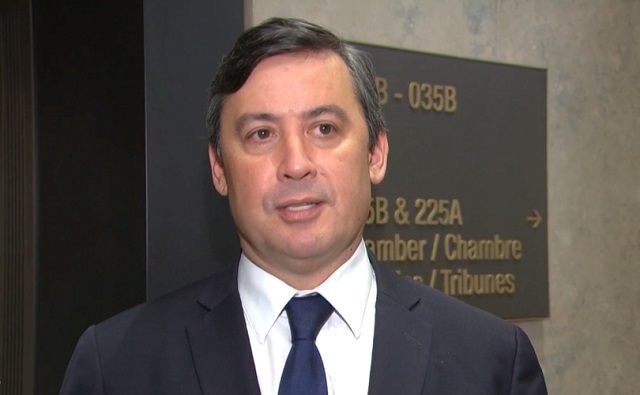Alberta
Video profile of Central Alberta’s beloved naturalist Myrna Pearman

It’s our great pleasure at Todayville.com to work with some of the most extraordinary people in this area. One of the wonderful people we are honoured to know is the Site Leader and Biologist in charge of the Central Alberta treasure, the Ellis Bird Farm. Myrna Pearman has dedicated her life to Central Alberta’s natural habitat and this month she was rightfully named Fellow of the Royal Canadian Geographical Society.
Please enjoy the video profile we produced with Myrna below. In the meantime, we’ll direct you to Myrna’s own words from her website introducing herself, and talking about the incredible honour bestowed on her by the Royal Canadian Geographical Society.
From MyrnaPearman.com
I am an enthusiastic naturalist, outdoors person and photographer. I am lucky to live on the south shore of beautiful Sylvan Lake, Alberta, where I enjoy both the view of the lake as well as the many trails that crisscross our woods.
My greatest joy in life is to get out in nature with my camera, to experience and capture the awesome beauty of this planet and her creatures. I hope that my small contributions—this website, my blog, books and columns—will encourage others to do the same.
I write a monthly nature photo essay in the Red Deer Advocate (third Thursday of the month) as well as a column (Wild Neighbours) in The Gardener magazine. I also produce the newsletter for the Red Deer River Naturalists, have a Facebook page, and occasionally contribute photos to several Facebook groups (Birds of Alberta Photography Group, Canadian Bird Photographer, Alberta Birds).
It has been my great fortune to have been at the helm of Ellis Bird Farm for the past 30 years. Ellis Bird Farm is both a non-profit company as well as a working farm, public garden and education centre, and I have been fortunate to oversee—with a very smart and dedicated team of board members, fellow contractors and summer staff—the growth of this wonderful place.
Fellow of the Royal Canadian Geographical Society
I am humbled and honoured to have been recently accepted as a Fellow of the Royal Canadian Geographical Society. The ceremony was held in Ottawa earlier this week.
How inspiring it was to be in the company of so many exemplary Canadians who also received fellowships, received medals, and who spoke at the evening gala (Dr. Roberta Bondar, Rt. Hon. Joe Clark, Rt. Hon. David Johnson to name a few)! A big thank you to Carol Patterson for the nomination. Carol has been a wonderful personal mentor and Ellis Bird Farm supporter over the years.
The experience was extra special because it was shared with a great personal friend and another Ellis Bird Farm champion (and founding board chairman), Morris Flewwelling. What a treat it was to also be in the company of Dr. Dee (who was also inducted) and Brian Keating (we are pictured here with Anne Innis Dogg, the “Jane Goodall of Giraffes”).
We live in troubled times, but there are so many talented and dedicated men and women across this great land who are working tirelessly on behalf of this beautiful country (and planet). My thanks to them!
Alberta
Maxime Bernier says it’s ‘astounding’ Alberta is ‘pushing’ COVID boosters, tells Danielle Smith to stop it

From LifeSiteNews
The People’s Party of Canada leader tells the Alberta government: ‘It’s over! Get over it!’
People’s Party of Canada (PPC) leader Maxime Bernier said Alberta Premier Danielle Smith should tell provincial health bureaucrats to “back off” and stop “pushing” the mRNA COVID boosters on “anyone,” considering a recent announcement from health officials recommending yet more COVID shots.
“I find it astounding that Alberta public health bureaucrats are still pushing the mRNA boosters on anyone, and especially on children who have never been at risk, almost two years after almost all other pandemic measures have been ended,” Bernier told LifeSiteNews.
“Danielle Smith’s government should tell its bureaucrats to back off and stop stupidly feeding a needless sense of fear surrounding the virus that lingers among certain groups of society. It’s over! Get over it!”
Earlier this week, officials from Alberta Health Services (AHS), whose chief medical officer throughout the COVID crisis, Dr. Deena Hinshaw, was fired by Smith in 2022, updated its COVID booster recommendations to every “three months” starting at babies only six months old.
“Starting April 15, 2024, select groups of Albertans at high risk of severe outcomes from COVID-19 will be eligible for an additional dose,” the AHS noted on its website.
AHS health officials still assert that all “vaccines are safe, effective and save lives,” and that one can get a COVID shot at the same time as a flu vaccine.
On April 16, Bernier commented on the AHS’s new COVID jab guideline changes on X, in which he asked, “What’s going on in Alberta with their “conservative” government?
Bernier, who was a firm opponent of both the COVID shots and mandates, told LifeSiteNews that AHS’s recommendations are puzzling, given “more and more scientific evidence is emerging of dangerous side effects when injecting from these experimental substances.”
“Even though these are only recommendations, and nothing is mandated, this ‘guidance’ by government agencies influences people’s decisions,” Bernier said.
AHS claims that the booster shots “are anticipated to provide a good immune response against currently circulating strains.”
Those under 18 still need written or verbal consent from their parents to get the shot.
AHS is recommending booster jabs for seniors, healthcare workers as well as those with underlying medical conditions. They also recommend that First Nations people and “members of racialized and other equity-denied communities,” as well as pregnant women get the shots as well.
The COVID shots were heavily promoted by the federal government as well as all provincial governments in Canada, with the Alberta government under former Premier Jason Kenney being no exception.
The mRNA shots themselves have been linked to a multitude of negative and often severe side effects in children.
Danielle Smith took over from Kenney as leader of the United Conservative Party (UCP) on October 11, 2022, after winning the leadership. Kenney was ousted due to low approval ratings and for reneging on promises not to lock Alberta down as well as enacting a vaccine passport. Smith was opposed to COVID jab mandates.
Bernier: It’s ‘deplorable’ some provinces still mandate COVID shot for Heathcare workers
While Alberta does not mandate the COVID shots for healthcare workers anymore, British Columbia still does as well as some health regions in Ontario, a fact that Bernier called “deplorable.”
“I find it deplorable that nurses, doctors and other healthcare workers in B.C. and Ontario still have to be vaccinated to work in hospitals and that thousands of them have not been reintegrated,” Bernier told LifeSiteNews.
“The authoritarian covid measures adopted by all governments have been traumatic enough for millions of Canadians. All of them should be lifted.”
Last year, LifeSiteNews reported on how the details of the Canadian federal government’s COVID-19 vaccine contract with Pfizer for millions of doses of the mRNA-based experimental shots were recently disclosed after being hidden for over three years.
The contract with Pfizer shows the government agreed to accept the unknown long-term safety and efficacy of the shots. The details of the Pfizer contract do not disclose how much the government spent on the jabs.
A bill introduced by Conservative Party leader Pierre Poilievre that would have given Canadians back their “bodily autonomy” by banning future jab mandates was voted down last year after Trudeau’s Liberals and other parties rejected it.
Adverse effects from the first round of COVID shots have resulted in a growing number of Canadians filing for financial compensation over injuries from the jabs via the federal Vaccine Injury Program (VISP).
VISP has already paid well over $11 million to those injured by COVID injections.
Earlier this year, LifeSiteNews reported on how officials from Health Canada have admitted that there is “residual plasmid DNA” in the COVID shots after a Conservative MP asked the agency through an official information request if the DNA fragments were in the shots.
As for Bernier, earlier this month he called out Poilievre for dodging a question regarding Canada’s participation in the United Nations’ pro-abortion Paris Climate Agreement.
Throughout most of the COVID crisis, Canadians from coast to coast were faced with COVID mandates, including jab dictates, put in place by both the provincial and federal governments.
After much pushback, thanks to the Freedom Convoy, most provincial mandates were eliminated by the summer of 2022.
There are currently multiple ongoing class-action lawsuits filed by Canadians adversely affected by COVID mandates.
Alberta
Canada’s advantage as the world’s demand for plastic continues to grow

From the Canadian Energy Centre
By Will Gibson
‘The demand for plastics reflects how essential they are in our lives’
From the clothes on your back to the containers for household products to the pipes and insulation in your home, plastics are interwoven into the fabric of day-to-day life for most Canadians.
And that reliance is projected to grow both in Canada and around the world in the next three decades
The Global Plastics Outlook, published by the Paris-based Organization for Economic Co-operation and Development (OECD), forecasts the use of plastics globally will nearly triple by 2060, driven by economic and population growth.
The use of plastics is projected to double in OECD countries like Canada, the United States and European nations, but the largest increases will take place in Asia and Africa.
“The demand for plastics reflects how essential they are in our lives, whether it is packaging, textiles, building materials or medical equipment,” says Christa Seaman, vice-president, plastics with the Chemical Industry Association of Canada (CIAC), which represents Canada’s plastics producers.
She says as countries look to meet climate and sustainability goals, demand for plastic will grow.
“Plastics in the market today demonstrate their value to our society. Plastics are used to make critical components for solar panels and wind turbines. But they also can play a role in reducing weight in transportation or in ensuring goods that are transported have less weight in their packaging or in their products.”
Canada produces about $35 billion worth of plastic resin and plastic products per year, or over five per cent of Canadian manufacturing sales, according to a 2019 report published by the federal government.
Seaman says Canadian plastic producers have competitive advantages that position them to grow as demand rises at home and abroad. In Alberta, a key opportunity is the abundant supply of natural gas used to make plastic resin.
“As industry and consumer expectations shift for production to reduce emissions, Canada, and particularly Alberta, are extremely well placed to meet increased demand thanks to its supply of low-carbon feedstock. Going forward, production with less emissions is going to be important for companies,” Seaman says.
“You can see that with Dow Chemical’s decision to spend $8.8 billion on a net zero facility in Alberta.”
While modern life would not be possible without plastics, the CIAC says there needs to be better post-use management of plastic products including advanced recycling, or a so-called “circular economy” where plastics are seen as a resource or feedstock for new products, not a waste.
Some companies have already started making significant investments to generate recyclable plastics.
For example, Inter Pipeline Ltd.’s $4.3 billion Heartland Petrochemical Complex near Edmonton started operating in 2023. It produces a recyclable plastic called polypropylene from propane, with 65 per cent lower emissions than the global average thanks to the facility’s integrated design.
Achieving a circular economy – where 90 per cent of post-consumer plastic waste is diverted or recycled – would benefit Canada’s economy, according to the CIAC.
A Deloitte study, commissioned by Environment & Climate Change Canada, estimated diverting or reusing 90 per cent of post-consumer plastic waste by 2030 will save $500 million annually while creating 42,000 direct and indirect jobs. It would also cut Canada’s annual CO2 emissions by 1.8 megatonnes.
Right now, about 85 per cent of plastics end up in Canada’s landfills. To reach the 90 per cent diversion rate, Seaman says Canada must improve its infrastructure to collect and process the plastic waste currently being landfilled.
But she also says the industry rather than municipalities need to take responsibility for recycling plastic waste.
“This concept is referred to as extended producer responsibility. Municipalities have the responsibility for managing recycling within a waste management system. Given the competing costs and priorities, they don’t have the incentive to invest into recycling infrastructure when landfill space was the most cost-effective solution for them,” she says.
“Putting that responsibility on the producers who put the products on the market makes the most sense…The industry is adapting, and we hope government policy will recognize this opportunity for Canada to meet our climate goals while growing our economy.”
-

 COVID-197 hours ago
COVID-197 hours agoCDC Quietly Admits to Covid Policy Failures
-

 COVID-1910 hours ago
COVID-1910 hours agoJapanese study shows disturbing increase in cancer related deaths during the Covid pandemic
-

 Great Reset5 hours ago
Great Reset5 hours agoClimate expert warns against extreme ‘weather porn’ from alarmists pushing ‘draconian’ policies
-

 Alberta2 days ago
Alberta2 days agoDanielle Smith warns arsonists who start wildfires in Alberta that they will be held accountable
-

 National2 days ago
National2 days agoCanada’s Governor General slammed for hosting partisan event promoting Trudeau’s ‘hate speech’ bill
-

 Economy1 day ago
Economy1 day agoExtreme Weather and Climate Change
-

 Bruce Dowbiggin1 day ago
Bruce Dowbiggin1 day agoWhy Are Canadian Mayors So Far Left And Out Of Touch?
-

 International1 day ago
International1 day agoTelegram founder tells Tucker Carlson that US intel agents tried to spy on user messages





